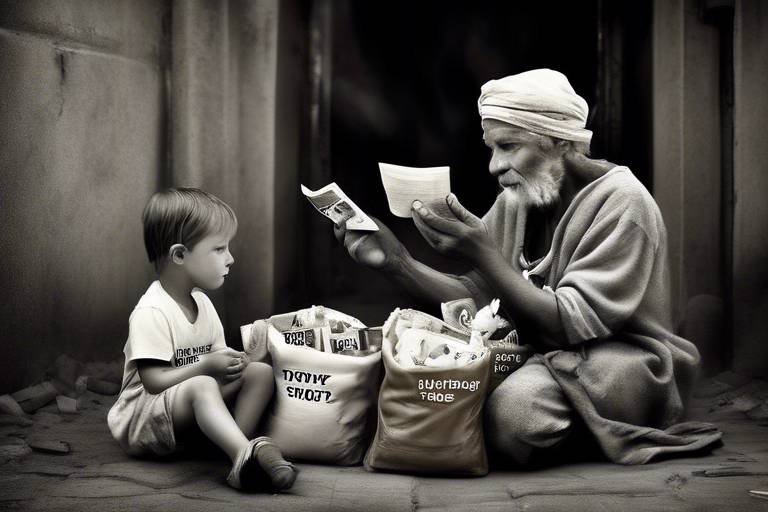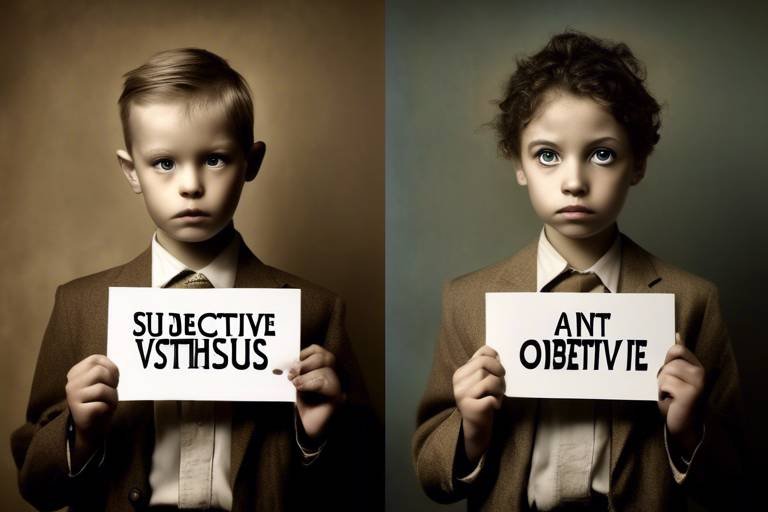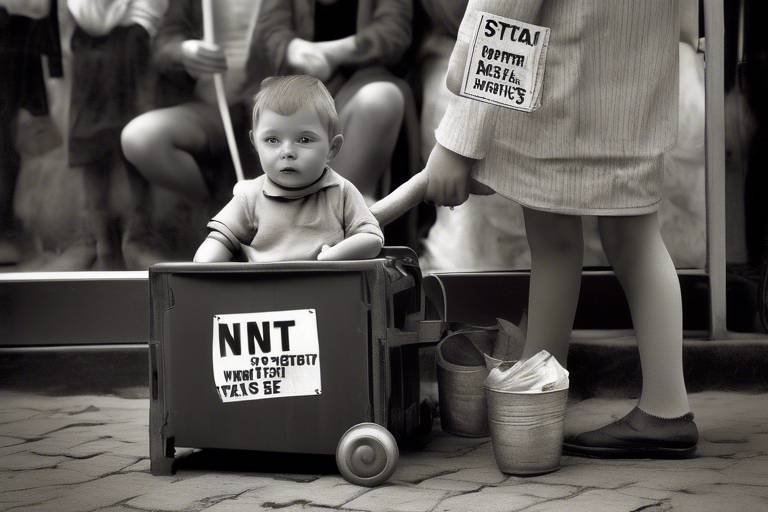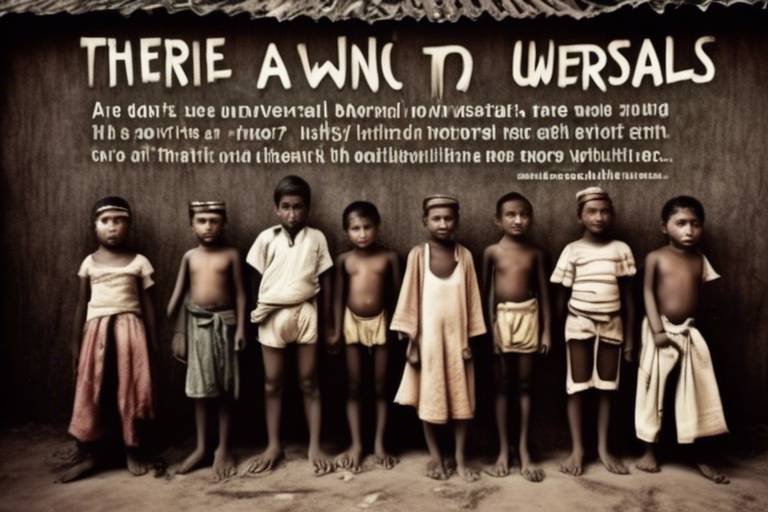What Constitutes a Moral Society?
In today’s fast-paced world, the question of what makes a society moral is more relevant than ever. A moral society is not just a collection of individuals; it’s a vibrant tapestry woven together by shared values, ethical principles, and a sense of community. But what exactly holds this fabric together? Is it merely the laws we abide by, or is there something deeper that binds us? In this exploration, we’ll delve into the fundamental elements that define a moral society, examining how ethical principles, cultural influences, and individual responsibility contribute to a just and harmonious community.
At the core of a moral society lies a set of ethical foundations that guide behavior and decision-making. These ethical principles serve as a compass, helping individuals navigate the complexities of right and wrong. Whether it’s through philosophical theories like utilitarianism, which emphasizes the greatest good for the greatest number, or deontological ethics, which focuses on adherence to rules and duties, these frameworks shape our understanding of morality. Imagine morality as a vast ocean; the ethical theories are the currents that guide us through its depths, helping us avoid the treacherous waters of immorality.
But ethical foundations alone are not enough. Culture plays a significant role in shaping our moral values, acting as the lens through which we view the world. Traditions, beliefs, and societal norms contribute to the collective moral compass of a community. For instance, in some cultures, collectivism is highly valued, leading to a strong emphasis on community welfare over individual desires. In contrast, other cultures may prioritize individual rights and freedoms, creating a different moral landscape. It’s fascinating to see how these cultural influences can create diverse interpretations of what is deemed right or wrong.
Ethical principles serve as the bedrock of a moral society, guiding behavior and decision-making. This section delves into various ethical theories that inform our understanding of morality.
Culture plays a significant role in shaping moral values. Here, we discuss how traditions, beliefs, and societal norms contribute to the collective moral compass of a community.
Religion often provides a framework for moral conduct. This subsection explores how different faiths contribute to the ethical standards upheld in various societies.
In addition to religious frameworks, secular morality offers alternative ethical guidelines. We examine how non-religious philosophies shape moral behavior in contemporary society.
Cultural diversity leads to varied moral interpretations. This section highlights how different societies define right and wrong, influencing their social dynamics.
Personal accountability is crucial in a moral society. This part discusses the importance of individual choices and their impact on the community's ethical landscape.
A moral society prioritizes social justice and equality. This section examines how fairness and equitable treatment contribute to a harmonious community.
Active participation in community initiatives fosters a sense of belonging and responsibility. We explore how engagement promotes moral values and strengthens societal bonds.
Education plays a pivotal role in instilling moral values. This subsection discusses the importance of teaching ethics in schools to cultivate responsible citizens.
- What are the key elements of a moral society? A moral society is characterized by ethical principles, cultural influences, individual responsibility, social justice, and community engagement.
- How does culture influence morality? Culture shapes our moral values through traditions, beliefs, and societal norms, leading to diverse interpretations of right and wrong.
- Can morality exist without religion? Yes, secular morality provides alternative ethical guidelines that can guide behavior and decision-making without a religious framework.
- Why is individual responsibility important? Individual responsibility is crucial as personal choices impact the community's ethical landscape, fostering a sense of accountability.

Ethical Foundations
Ethical principles serve as the bedrock of a moral society, guiding behavior and decision-making in ways that resonate deeply within our communities. Think of ethics as the invisible threads that weave together the fabric of our social interactions. Without these threads, society would unravel into chaos. Various ethical theories have emerged over centuries, each offering unique perspectives on what it means to be moral. From the ancient teachings of philosophers like Aristotle, who emphasized virtue ethics, to the more contemporary frameworks of utilitarianism and deontology, these theories provide a compass for our moral journey.
At the heart of ethical discussions lies a fundamental question: What is the right thing to do? This question isn't just philosophical fluff; it has real-world implications. For instance, consider the ethical theory of utilitarianism, which suggests that the best action is the one that maximizes happiness for the greatest number of people. This principle can guide decision-making in public policy, healthcare, and even personal relationships. On the other hand, deontological ethics, championed by Immanuel Kant, posits that actions should be judged based on their adherence to rules and duties, regardless of the consequences. This perspective emphasizes the importance of intention and righteousness, reminding us that the journey toward moral action is just as significant as the outcome.
Furthermore, these ethical foundations are not merely academic; they are lived experiences that shape our daily choices. For instance, when faced with a dilemma, individuals often weigh their options against their ethical beliefs. This internal dialogue is crucial in fostering a moral society. It encourages us to reflect on our values and consider how our actions affect others. In this light, personal accountability becomes paramount. Each decision we make contributes to the larger moral landscape of our community, influencing collective behavior and societal norms.
To illustrate the significance of ethical foundations, let’s consider a table that summarizes some key ethical theories and their implications:
| Ethical Theory | Key Principle | Real-World Application |
|---|---|---|
| Utilitarianism | Maximize happiness for the greatest number | Public policy decisions |
| Deontology | Adhere to rules and duties | Legal systems and moral laws |
| Virtue Ethics | Focus on character and virtues | Personal development and leadership |
In conclusion, the ethical foundations of a moral society are multifaceted, encompassing various theories and principles that guide our behavior. They remind us that morality is not a one-size-fits-all concept; rather, it is a dynamic interplay of beliefs, intentions, and actions. By understanding and embracing these ethical frameworks, we can foster a more compassionate and just community, where individual actions contribute to the collective good.

Cultural Influence on Morality
Culture is not just a backdrop to our lives; it is the vibrant canvas that shapes our moral compass. Think about it: every tradition, belief, and societal norm we encounter influences how we perceive right and wrong. This cultural framework serves as the lens through which we interpret our experiences and make ethical decisions. For instance, in some cultures, communal well-being is prioritized over individual desires, while in others, personal freedom takes center stage. These differing perspectives highlight the rich tapestry of moral values that exist across the globe.
At its core, culture encompasses a myriad of factors, including language, art, customs, and shared history. Each of these elements contributes to a community's understanding of morality. For example, in many Indigenous cultures, the concept of stewardship towards the environment is not just a value but a sacred duty. This deep-rooted belief fosters a sense of responsibility towards nature that transcends generations. Conversely, in more industrialized societies, the focus may lean towards economic growth, sometimes at the expense of environmental considerations. Such contrasts illustrate how cultural contexts can lead to varying moral interpretations.
Moreover, cultural narratives and folklore often carry moral lessons that resonate with community members. Stories passed down through generations serve to reinforce ethical standards and behaviors. These narratives can be powerful tools for moral education, as they often encapsulate complex ethical dilemmas in relatable scenarios. For instance, Aesop's Fables, with their simple yet profound messages, have been used across cultures to teach children about honesty, kindness, and the consequences of one's actions.
However, the influence of culture on morality is not static; it evolves over time. As societies become more interconnected through globalization, cultural exchanges can lead to the blending of moral values. This interaction can enrich our understanding of ethics but can also spark conflicts when differing moral beliefs clash. For example, the debate around human rights often sees cultural relativism pitted against universalism, raising questions about whether moral standards should be consistent across different societies or adapted to fit local customs.
In summary, culture profoundly influences our moral frameworks, shaping our perceptions of right and wrong. As we navigate an increasingly diverse world, understanding these cultural nuances becomes essential. It enables us to appreciate different moral perspectives and fosters empathy towards those whose experiences may differ from our own. By embracing this cultural richness, we can work towards a more harmonious society where diverse moral views coexist and contribute to the greater good.
- How does culture shape individual morality?
Culture provides the context in which we learn about ethical behavior, influencing our values, beliefs, and actions. - Can moral values change over time?
Yes, as societies evolve and interact with one another, moral values can shift and adapt to new cultural influences. - What role do stories play in moral education?
Stories often convey moral lessons and help individuals understand complex ethical dilemmas in a relatable way.

Religious Perspectives
Religion has long been a cornerstone in the establishment of moral frameworks across various societies. It provides not just a set of rules, but a profound sense of purpose and belonging. Different faiths contribute unique ethical standards, shaping how their followers perceive right and wrong. For instance, many religions advocate for core values such as compassion, honesty, and justice. These principles often serve as guiding lights for individuals navigating the complexities of life.
Let’s consider some major world religions and their moral contributions:
| Religion | Core Moral Teachings |
|---|---|
| Christianity | Love thy neighbor, forgiveness, charity |
| Islam | Compassion, justice, respect for elders |
| Hinduism | Dharma (duty), non-violence, truthfulness |
| Buddhism | Mindfulness, compassion, the Middle Way |
As you can see from the table, while each religion has its unique teachings, there are common threads that highlight the universal quest for moral integrity. These teachings often encourage adherents to reflect on their actions and the impact they have on others. For example, the concept of compassion is central to both Buddhism and Islam, urging followers to act with kindness and empathy towards others.
Moreover, religious gatherings and rituals reinforce these ethical standards, creating a community where moral behavior is celebrated and encouraged. Whether it’s through communal prayers, charitable acts, or festivals, the collective reinforcement of moral values fosters a strong sense of community and shared responsibility. This communal aspect is vital; it reminds individuals that their actions resonate beyond personal boundaries, impacting the larger society.
However, it's essential to recognize that not everyone subscribes to religious beliefs. In secular societies, moral principles may derive from humanistic philosophies that emphasize reason and ethical reasoning. Yet, the influence of religion remains significant, as many secular moral frameworks still echo the teachings of various faiths. This interplay between religious and secular perspectives creates a rich tapestry of moral understanding, allowing for a diverse yet interconnected ethical landscape.
In conclusion, religious perspectives on morality are not just about adhering to a set of rules; they encompass a broader journey of understanding, reflection, and community building. They offer a lens through which individuals can navigate the moral complexities of life, ultimately contributing to the overall fabric of a moral society.
- What role does religion play in shaping morality?
Religion often provides ethical guidelines that influence how individuals and communities define right and wrong. - Can moral values exist without religion?
Yes, secular philosophies can also offer robust frameworks for moral behavior based on reason and humanistic principles. - How do different religions compare in their moral teachings?
While different religions have unique teachings, many share common values such as compassion, justice, and honesty.

Secular Morality
Secular morality is an intriguing concept that offers a different lens through which we can view ethical behavior and decision-making. Unlike religious morality, which often derives its principles from sacred texts or divine commandments, secular morality is based on human reasoning, empathy, and the shared experiences of individuals within a society. This approach raises a fundamental question: Can we establish a moral framework without relying on religious beliefs? The answer is a resounding yes, as many secular philosophies provide robust ethical guidelines that help shape a just society.
At its core, secular morality is grounded in the idea that humans are capable of understanding right from wrong through rational thought and emotional intelligence. This perspective emphasizes the importance of considering the consequences of our actions and the well-being of others. For instance, utilitarianism, a prominent secular ethical theory, advocates for actions that maximize happiness and minimize suffering for the greatest number of people. In practical terms, this means that when faced with a moral dilemma, individuals should weigh the potential outcomes and choose the option that promotes overall welfare.
Moreover, secular morality encourages individuals to take responsibility for their actions based on a shared human experience rather than divine authority. This concept fosters a sense of community and interconnectedness, as people recognize that their choices can significantly impact others. It also promotes a culture of accountability, where individuals are urged to reflect on their values and the implications of their decisions. For example, consider a scenario where a person witnesses an act of injustice. A secular moral framework would compel them to act, not out of fear of divine retribution, but from a genuine desire to uphold fairness and support the oppressed.
In addition, secular morality often incorporates the principles of human rights and social justice, advocating for the dignity and equality of all individuals. This is particularly relevant in today’s diverse societies, where varying beliefs and backgrounds coexist. Secular ethics provides a common ground for dialogue and understanding, allowing people from different walks of life to collaborate toward shared goals. It is this inclusivity that can lead to a more harmonious community, where moral values are not dictated by a single doctrine but are instead shaped by collective human experiences and aspirations.
To illustrate the impact of secular morality, we can look at various movements throughout history that have championed ethical causes based on reason and empathy. For instance, the civil rights movement in the United States was driven by the belief that all individuals deserve equal rights, irrespective of race or background. Activists like Martin Luther King Jr. appealed to a sense of justice that resonated with people across different faiths and beliefs, demonstrating that secular morality can unite individuals in pursuit of a common ethical goal.
In conclusion, secular morality plays a vital role in shaping ethical behavior in contemporary society. It empowers individuals to make moral choices based on reason, empathy, and a commitment to the well-being of others. By fostering a culture of accountability and inclusivity, secular ethics can help build a more just and harmonious community. As we navigate the complexities of modern life, embracing secular morality may be one of the most effective ways to promote understanding and cooperation among diverse populations.
Frequently Asked Questions
- What is secular morality? Secular morality refers to ethical principles that are based on human reasoning and shared experiences rather than religious beliefs.
- How does secular morality differ from religious morality? While religious morality is derived from divine commandments, secular morality is grounded in rational thought and empathy.
- Can secular morality promote social justice? Yes, secular morality often emphasizes human rights and equality, making it a strong advocate for social justice.
- How can individuals apply secular morality in their lives? Individuals can apply secular morality by considering the consequences of their actions, reflecting on their values, and striving to act in ways that promote the well-being of others.

Morality in Diverse Cultures
When we talk about morality, it’s fascinating to realize that it’s not a one-size-fits-all concept. In fact, morality is often shaped by the cultural lens through which individuals view the world. Different cultures have their own unique sets of values and beliefs, which influence their definitions of right and wrong. For instance, what might be considered a moral obligation in one culture could be viewed as an infringement on personal freedom in another. This divergence can lead to misunderstandings and conflicts, but it also enriches the global tapestry of human experience.
Consider the concept of community versus individualism. In collectivist cultures, such as those found in many Asian countries, the emphasis is often placed on the group's needs over the individual's desires. Here, moral actions are judged by their impact on family and community. In contrast, Western cultures, which typically prioritize individualism, may view moral behavior through the lens of personal rights and freedoms. This difference can lead to a variety of moral interpretations that can sometimes clash, especially in our increasingly globalized world.
To illustrate this point, let’s take a look at how different cultures approach specific moral dilemmas. For example:
| Cultural Context | Moral Dilemma | Common Resolution |
|---|---|---|
| Western Cultures | Freedom of Speech | Strong emphasis on individual expression, even if it may offend others. |
| Eastern Cultures | Community Harmony | Prioritizing group consensus, sometimes limiting individual expression to maintain peace. |
Furthermore, cultural traditions and historical contexts play a significant role in shaping moral attitudes. For example, Indigenous cultures often have a profound connection to the land and nature, which informs their moral beliefs about stewardship and respect for the environment. This contrasts sharply with industrialized societies, where economic growth may sometimes take precedence over environmental concerns. Such differences highlight the importance of understanding and respecting diverse moral frameworks.
It’s also worth noting that globalization is creating new moral landscapes. As cultures interact more frequently, they are beginning to share and blend their moral values. This can lead to a broader understanding of morality but can also spark tensions as traditional values are challenged. For instance, the global discourse around human rights has led to significant changes in many cultures, prompting debates about gender equality, LGBTQ+ rights, and freedom of expression. The challenge lies in finding a balance between respecting cultural differences while advocating for universal moral principles.
In conclusion, morality in diverse cultures is a complex and dynamic topic that reflects the rich variety of human experience. By embracing this diversity, we can foster a more inclusive understanding of morality that respects individual backgrounds while promoting a common ethical foundation. After all, understanding each other’s moral frameworks can pave the way for greater empathy and cooperation in our interconnected world.
- What is the role of culture in shaping morality? Culture influences moral values by providing a framework through which individuals interpret right and wrong based on their traditions and beliefs.
- Can different cultures coexist with their moral beliefs? Yes, different cultures can coexist, but it requires mutual respect and understanding to navigate moral differences.
- How does globalization affect moral values? Globalization can lead to the sharing and blending of moral values, but it can also challenge and sometimes clash with traditional beliefs.

Individual Responsibility
Individual responsibility is the cornerstone of any moral society. It’s the idea that each person is accountable for their actions and decisions, and that these choices can significantly impact the community as a whole. Imagine a chain reaction: one person’s good deed can inspire another, creating a ripple effect of positive behavior. Conversely, a single irresponsible act can lead to a series of unfortunate consequences. This interconnectedness highlights why personal accountability is not just a personal matter; it’s a communal one.
In a moral society, the weight of individual choices becomes even more pronounced. Each decision we make, whether it's in our personal lives or in the public sphere, contributes to the ethical landscape of our community. For instance, when individuals choose to engage in charitable acts, volunteerism, or simply practice kindness, they are not only enhancing their own lives but also uplifting those around them. This creates a culture of compassion and mutual support, which is essential for a harmonious society.
Moreover, individual responsibility extends beyond mere actions; it also encompasses the values we uphold and the principles we advocate. When individuals take the initiative to educate themselves about social issues, advocate for justice, and challenge inequality, they foster an environment where moral values can thrive. It’s about being proactive rather than reactive. In this sense, responsibility is not just about avoiding wrongdoing but actively contributing to the betterment of society.
To illustrate this concept further, consider the following examples of responsible behaviors:
- Volunteering: Offering your time and skills to help those in need demonstrates a commitment to the community.
- Advocacy: Speaking out against injustice or inequality shows that you care about the welfare of others.
- Education: Taking the time to learn about different cultures and perspectives can foster understanding and empathy.
The impact of individual responsibility can also be seen in the collective moral compass of society. When individuals prioritize ethical behavior, they encourage a culture where integrity and honesty are valued. This, in turn, leads to a community that is more resilient, compassionate, and just. It’s a beautiful cycle: responsible individuals create a better society, which in turn nurtures more responsible individuals.
However, it’s essential to recognize that the burden of responsibility does not fall solely on the shoulders of individuals. Societal structures and systems play a significant role in shaping behavior. For instance, when communities provide resources and support for education, mental health, and social services, they empower individuals to make responsible choices. Thus, fostering a moral society requires a collaborative effort between individuals and institutions.
In conclusion, individual responsibility is a vital component of a moral society. By making conscious choices and holding ourselves accountable, we contribute to a culture of integrity and compassion. It’s a reminder that each of us has the power to influence our surroundings positively. So, let’s embrace this responsibility and strive to create a community where moral values are not just ideals but lived realities.
- What is individual responsibility? Individual responsibility refers to the idea that each person is accountable for their actions and decisions, which collectively influence society.
- How does individual responsibility impact society? Responsible individuals contribute to a culture of compassion and integrity, leading to a more harmonious and just community.
- Can societal structures affect individual responsibility? Yes, supportive societal structures can empower individuals to make responsible choices and foster moral values.

Social Justice and Equality
In any discussion about what constitutes a moral society, social justice and equality stand out as pivotal elements. These concepts are not merely buzzwords; they represent the very foundation upon which a fair and just community is built. Imagine a society where everyone has equal access to opportunities, resources, and rights. Sounds ideal, right? But achieving such a state requires effort, understanding, and commitment from every individual.
At its core, social justice emphasizes the fair distribution of wealth, opportunities, and privileges within a society. It challenges the systemic inequalities that exist and calls for a more equitable approach to governance and community support. When we think about social justice, we often consider various factors, including race, gender, economic status, and education. Each of these factors plays a crucial role in how individuals experience life within their communities. For instance, consider the disparities in education funding across different neighborhoods. Children in affluent areas often have access to better schools, while those in less privileged neighborhoods struggle with underfunded institutions. This is a clear example of how inequality can perpetuate a cycle of disadvantage.
Furthermore, equality is not just about treating everyone the same; it's about recognizing and addressing the unique challenges faced by different groups. A moral society understands that equity—providing individuals with what they need to succeed—is just as important as equality. For example, affirmative action policies aim to level the playing field by offering additional support to those who have historically been marginalized. This approach acknowledges that not everyone starts from the same place and that some may need extra help to reach their goals.
To truly foster social justice and equality, communities must engage in open dialogues about their values and practices. This engagement often takes the form of community meetings, forums, or workshops where individuals can share their experiences and perspectives. By listening to one another, we can develop a deeper understanding of the issues at hand and work collectively towards solutions. In this way, community engagement becomes a cornerstone of moral society, fostering a sense of belonging and shared responsibility.
Moreover, education plays a vital role in promoting social justice and equality. Schools are not just places for academic learning; they are also arenas where children learn about fairness, respect, and the importance of diversity. Incorporating social justice education into curricula can empower students to recognize injustices and advocate for change. By teaching young people about the history of civil rights movements, the impact of systemic discrimination, and the importance of inclusivity, we can cultivate a generation that values equality and actively works towards achieving it.
In conclusion, a moral society prioritizes social justice and equality as fundamental principles. By understanding the nuances of these concepts and actively engaging with them, individuals can contribute to a more harmonious community. It is essential to recognize that achieving social justice and equality is an ongoing journey, one that requires dedication and collaboration from all members of society. As we strive for a better world, let us remember that every action counts, and together, we can create a future where everyone has the opportunity to thrive.
- What is social justice? Social justice refers to the fair distribution of wealth, opportunities, and privileges within a society, aiming to address systemic inequalities.
- How does equality differ from equity? Equality means treating everyone the same, while equity involves recognizing individual needs and providing support accordingly.
- Why is education important for promoting social justice? Education helps individuals understand social issues, empowers them to advocate for change, and fosters a sense of responsibility towards creating a fair society.
- How can individuals contribute to social justice? Individuals can engage in community discussions, support equitable policies, and educate themselves and others about social justice issues.

Community Engagement
Community engagement is not just a buzzword; it's the lifeblood of a moral society. When individuals actively participate in their communities, they contribute to a vibrant tapestry of shared values and collective responsibility. Imagine a neighborhood where everyone knows each other, where people come together for a common cause, and where the spirit of cooperation reigns supreme. This is the essence of community engagement—a platform for fostering moral values and strengthening societal bonds.
Engagement can take many forms, from volunteering at local shelters to participating in town hall meetings. Each action, no matter how small, contributes to a larger narrative of community well-being. When citizens step up and take part, they not only enhance their own lives but also uplift those around them. This ripple effect is what makes community engagement so powerful. It creates a sense of belonging and responsibility that is crucial for maintaining ethical standards within society.
Furthermore, community engagement encourages dialogue and understanding among diverse groups. In a world that often feels divided, coming together to discuss issues, celebrate cultures, and share experiences can bridge gaps and foster empathy. For example, local events like cultural festivals or neighborhood clean-up days can serve as melting pots for different perspectives, allowing individuals to learn from one another and cultivate a shared sense of morality.
To illustrate the impact of community engagement, consider the following table that outlines various forms of engagement and their benefits:
| Type of Engagement | Benefits |
|---|---|
| Volunteering | Builds skills, fosters connections, and addresses community needs. |
| Participating in Local Governance | Empowers citizens, promotes transparency, and strengthens democracy. |
| Organizing Community Events | Encourages social interaction, celebrates diversity, and promotes unity. |
| Joining Local Advocacy Groups | Raises awareness on important issues, empowers marginalized voices, and influences policy changes. |
It's essential to recognize that community engagement is a two-way street. While individuals benefit from participating, the community also thrives when its members are involved. This mutual relationship cultivates an environment where ethical behavior is not just encouraged but expected. In essence, when people invest time and effort into their communities, they are investing in a moral future.
In conclusion, community engagement is a cornerstone of a moral society. It fosters a sense of belonging, encourages dialogue, and promotes shared values. By actively participating in our communities, we can create a more just and harmonious world, where everyone feels valued and responsible for one another's well-being.
- What is community engagement? Community engagement refers to the process of involving individuals in activities that contribute to their community's well-being and development.
- Why is community engagement important? It fosters a sense of belonging, encourages collaboration, and strengthens moral values within society.
- How can I get involved in my community? You can volunteer, attend local meetings, participate in community events, or join advocacy groups that align with your interests.
- What are the benefits of community engagement? Benefits include building social connections, enhancing personal skills, promoting social justice, and contributing to a supportive community environment.

Education and Morality
Education is not just about acquiring knowledge; it is a powerful tool that shapes our understanding of morality and ethical behavior. Imagine a world where every child grows up with a solid foundation of moral values—where they learn the importance of honesty, empathy, and respect for others. This is the potential that education holds. By integrating ethical teachings into the curriculum, we can cultivate a generation that not only excels academically but also contributes positively to society.
Incorporating morality into education involves more than just discussing right and wrong; it requires a holistic approach that engages students in real-life situations. For instance, educators can use case studies, role-playing, and group discussions to help students navigate complex moral dilemmas. This interactive learning process encourages critical thinking and allows students to explore various perspectives, ultimately leading to a more nuanced understanding of ethical issues.
Moreover, teaching morality in schools helps to create a safe and inclusive environment. When students learn about the impact of their actions on others, they become more aware of the consequences of their behavior. This awareness fosters a sense of responsibility and accountability, which are essential traits in a moral society. By promoting values such as kindness and cooperation, schools can significantly reduce instances of bullying and discrimination, creating a more harmonious atmosphere for learning.
It’s also important to recognize that education should not be limited to the classroom. Parents and communities play a crucial role in reinforcing moral values. When families engage in discussions about ethics and morality at home, it complements the lessons taught in schools. This partnership between educators and families can create a consistent moral framework that guides children as they navigate the complexities of life.
To illustrate the impact of education on morality, let’s look at a few key components that can be integrated into educational systems:
- Character Education: Programs designed to teach students about virtues such as honesty, respect, and responsibility.
- Service Learning: Opportunities for students to engage in community service, fostering empathy and social responsibility.
- Ethics Curriculum: Courses that focus specifically on ethical theories and moral philosophy, encouraging students to think critically about their beliefs.
In conclusion, education is a vital pillar in the construction of a moral society. It has the power to instill values that shape not only individual character but also the collective ethos of communities. As we continue to evolve and adapt our educational systems, let’s prioritize the integration of moral teachings, ensuring that future generations are equipped to navigate the moral complexities of our world with integrity and compassion.
Q: Why is it important to teach morality in schools?
A: Teaching morality in schools helps students develop a strong ethical foundation, promotes social responsibility, and creates a safer, more inclusive learning environment.
Q: How can parents support moral education at home?
A: Parents can support moral education by engaging in discussions about ethics, modeling positive behavior, and encouraging their children to participate in community service.
Q: What are some effective methods for teaching morality in the classroom?
A: Effective methods include character education programs, role-playing scenarios, group discussions, and integrating service learning projects into the curriculum.
Frequently Asked Questions
- What are the key ethical principles that define a moral society?
Ethical principles such as honesty, integrity, fairness, and respect for others form the foundation of a moral society. These principles guide individuals in making decisions that consider the well-being of others and the community as a whole.
- How does culture influence moral values?
Culture shapes our understanding of right and wrong through traditions, beliefs, and societal norms. Different cultures may have distinct interpretations of morality, which can lead to diverse ethical standards and practices within a community.
- What role does religion play in morality?
Religion often provides a framework for moral conduct, offering guidelines and teachings that influence ethical behavior. Different faiths contribute unique perspectives on morality, shaping the values upheld by their adherents.
- Can morality exist without religion?
Yes, secular morality offers alternative ethical guidelines that do not rely on religious beliefs. Philosophies such as humanism and utilitarianism provide frameworks for understanding morality based on reason and human experience.
- How can individual responsibility enhance a moral society?
Personal accountability is vital in a moral society. When individuals make ethical choices and take responsibility for their actions, they contribute positively to the community's moral landscape, fostering a culture of integrity and respect.
- Why is social justice important in a moral society?
A moral society prioritizes social justice and equality, ensuring that all individuals are treated fairly and have access to opportunities. This commitment to equity helps create a harmonious community where everyone can thrive.
- What is the significance of community engagement?
Active participation in community initiatives fosters a sense of belonging and responsibility among individuals. Engagement promotes moral values, strengthens societal bonds, and encourages collective action towards common goals.
- How does education influence moral development?
Education plays a crucial role in instilling moral values in individuals. Teaching ethics in schools cultivates responsible citizens who are aware of their impact on society and equipped to make ethical decisions throughout their lives.



















